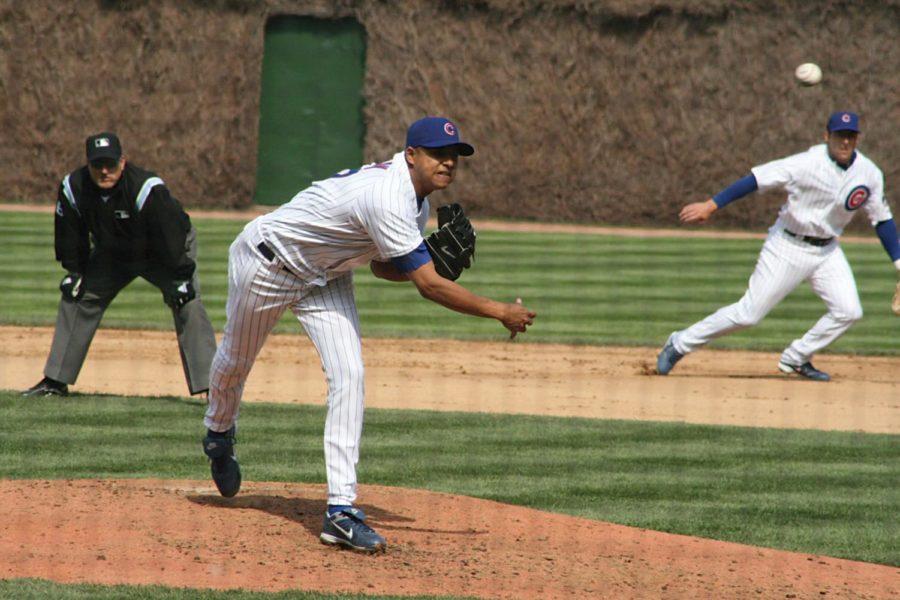ISU graduate makes his way to Major League umpiring
Eric Cooper, an Iowa State alumnus with a degree in transportation logistics, entered umpire school after graduation and is now a Major League Baseball umpire. He has been an umpire for 30 years, and he is one of only 68 MLB umpires.
October 18, 2011
Thousands of people watched the Detroit Tigers beat the New York Yankees last week in the American League Division Series with eyes glued on the all-star-caliber batters and pitchers on both teams.
No. 56 had the most impact on the game in the whole series. Readers might be confused by this because there isn’t a No. 56 on either team, but rather on the officiating team.
No. 56 belongs to official Eric Cooper, an ISU graduate, which may come as a surprise to many.
Cooper is an ISU alumnus of the class of 1989 and graduated with a degree in transportation logistics.
“It would make sense that I would get a degree in transportation logistics and become a major league umpire, right?” Cooper said jokingly. “After college, I entered the Joe Brinkman Umpire School in Cocoa, Fla. There, I learned to expand the skills I learned from officiating at Iowa State by learning as a student, then learning as a teacher.”
Less than one percent of officials that go to umpire school make it into Major League Baseball. With only 68 umpires in the MLB, usually the only way someone becomes an umpire is if another umpire retires. The average job span for an umpire is 25 to 30 years.
Garry Greenlee, assistant director of Recreation Services, had his eye on the baseball game, but also his former student officiating home plate.
“It is truly a great feeling to see a friend and former student doing big things,” Greenlee said. “He was always a real natural at officiating sports, but he really excelled at it most in baseball.”
Cooper is now in his 22nd year as a professional umpire. He spent nine years in the minors officiating A, AA and AAA baseball before making the jump into the majors in 1999.
He was the home plate umpire for Hideo Nomo’s no-hitter against Baltimore on April 6, 2001, Mark Buehrle’s no hitter against Texas on April 18, 2007, and a perfect game Buehrle also pitched against Tampa Bay on July 23, 2009.
Cooper is only one of two active MLB umpires to have worked multiple no-hitters.
“Officiating those games was very intense,” Cooper said. “When everyone in the stands starts to realize something special could happen in the later innings, you see everyone standing and can literally feel the pressure.
“At that time, you just have to take a deep breath and call the best game you can and as fair as possible.”
Cooper also has been involved in other historically changing events, such as — oddly enough — the first bee delay.
“In San Diego in the seventh inning, the left fielder came in screaming about bees,” Cooper said. “It turned out a swarm of thousands of bees had made a home in left field and would not leave. We had to call in the bee keeper and wait until all the bees were gone until we could finish the game. That was by far the most bizarre thing I have seen in officiating sports.”
Cooper definitely believes he learned important things at Iowa State that weren’t just officiating skills, but rather ranging from prioritizing to accountability.
“So much of officiating has to do with communicating with the managers and players, then making all the right decisions,” Cooper said. “It’s not so far-fetched to say that going to college helped me become a better official.”
After the third game of the ALDS, Detroit catcher Alex Avila said in a postgame interview, “We’ve had some of the best umpires in the series behind the plate and on the field,” accrediting Cooper and his crew of officials.
Even though Greenlee watches Cooper on national TV, he still has fond memories of Cooper at some of his first games umpiring.
“I still remember being with Eric on his first ejection in some Legion game in Ames,” said Greenlee. “The catcher went to tag the base runner at home plate and the catcher missed. The manager didn’t agree with the call. After some yelling from the manager, Eric, with great composure and confidence, tossed him.
“He still has the confidence and poise he did back then that he has today. That’s what makes him one of the best umpires in the game of baseball today.”







